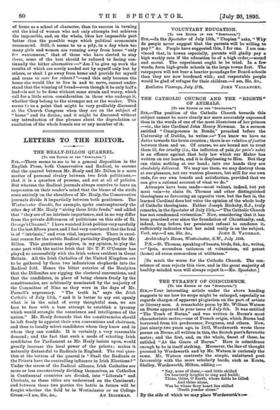LETTERS TO THE EDITOR.
THE HEALY-DILLON QUARREL.
[To THE EDITOR OF THE "SPECTATOR.'
SIR,—There seems to me to be a general disposition in the English Press, both Conservative and Radical, to assume that the quarrel between Mr. Healy and Mr. Dillon is a mere matter of personal rivalry between two Irish politicians,— that it is a question of persons, and not at all of policies. Bat whereas the Radical journals always contrive to leave an impression on their reader's mind that the blame of the strife rests entirely on the shoulders of Mr. Healy, the Conservative journals divide it impartially between both gentlemen. The Westminster Gazette, for example, spoke contemptuously the other day of Mr. Healy "airing these little feuds," and added that "they are of no intrinsic importance, and in no way differ from the private differences of politicians on this side of St. George's Channel." I have watched Irish politics very carefully for the last fifteen years, and I feel very convinced that the feud is of "intrinsic," and even vital, importance. There is excel- lent reason for the subtle Radical partiality displayed for Mr. Dillon. This gentleman aspires, in my opinion, to play the same part with the native Irish that Mr. T. P. O'Connor has played, so successfully with the Irish voters resident in Great Britain. All the Irish Catholics of the United Kingdom are to be gathered by those two industrious shepherds into the Radical fold. Hence the bitter outcries of the Healyites that the Dillonites are rigging the electoral conventions, and that the candidates, in place of being chosen freely by the constituencies, are arbitrarily nominated by the majority of the Committee of Nine as they were in the days of Mr. Parnell's supremacy. " The truth is," says the Irish Catholic of July 13th, "and it is better to say out openly what is in the mind of every thoughtful man, we are face to face with a base attempt to establish a tyranny which would strangle the conscience and intelligence of the nation." Mr. Healy demands that the constituencies should be left freely to appoint their own conventions and chairman, and thus to locally select candidates whom they know and in whom they can confide. It is certainly a very reasonable demand ; and the fact that such a mode of selecting Irish candidates for Parliament as Mr. Healy insists upon, would greatly increase the local power of the priests ; makes it naturally distasteful to Radicals in England. The real ques- tion at the bottom of the quarrel is "Shall the Radicals or the Priests have the controlling influence in Irish Elections ?" Under the stress of the Radical alliance, Irish Catholics are more or less unconsciously dividing themselves, as Catholics in Continental countries are divided, into "Liberals" and Clericals, as those titles are understood on the Continent; and between those two parties the battle in future will be fought whether the field be in Westminster or on College


































 Previous page
Previous page